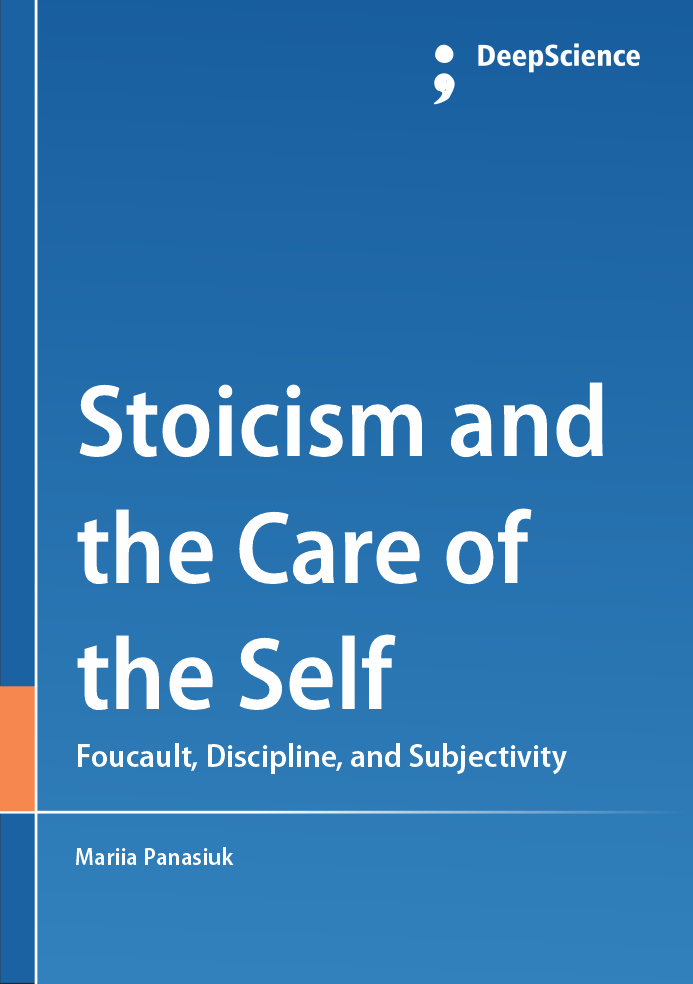Stoicism and the Care of the Self: Foucault, Discipline, and Subjectivity
Keywords:
Stoicism, Michel Foucault, Genealogy, Discipline, Neostoicism, Self-formation, HypomnemataSynopsis
This book undertakes a sustained, interdisciplinary genealogy of practices of self-formation by placing the Stoic corpus in productive dialogue with Michel Foucault’s late ethical writings. Rather than offering a cosmetic comparison of two attractive traditions, the study pursues a two-fold argumentative strategy. First, it reconstructs Stoicism as a praxis-oriented ethical pedagogy: a dense repertoire of askēseis (spiritual exercises) — nightly self-examinations, premeditatio malorum, prosoche (attentive care), hypomnemata and other writing practices — that together constitute a historically specific grammar for shaping judgment, affect, and proairesis. Second, it reads those micro-techniques through Foucauldian categories — technologies of the self, care (epimeleia heautou), parrhesia, and the genealogy of discipline — in order to historicize and politicize their institutional afterlives (pastoral, neostoic, bureaucratic, therapeutic, and digital).
Methodologically, the study combines philological close readings of key Stoic passages (Seneca, Epictetus, Marcus Aurelius) with sustained engagement with the Collège de France lectures and late essays of Foucault (The Care of the Self; The Hermeneutics of the Subject; The Courage of the Truth), and with reception histories that include neostoicism (Justus Lipsius), confessional and pastoral practices, and modern psychotechnologies (CBT/REBT, journaling, self-tracking). The book employs a genealogical-phenomenological frame: genealogical in the Foucauldian sense of tracing contingent re-configurations and transfers of practice across regimes of truth and power; phenomenological in the sense of reconstructing the procedural texture and aims of exercises as lived and enacted regimens rather than as merely doctrinal statements.
The core analytic contribution is a taxonomy that differentiates (1) inward techniques (cognitive and somatic exercises aimed at modifying assent and desire), (2) relational technologies (tutorship, exemplarity, parrhesiastic interlocution), and (3) institutional frameworks (schools, pastoral systems, disciplinary bureaucracies, market and platform architectures) that re-embed and repurpose those techniques. Using this taxonomy, the book demonstrates how Stoic askēsis can function simultaneously as a resource for ethical agency and as a substrate for processes of normalization and responsibilization characteristic of later pastoral and modern governmental regimes. The study pays particular attention to ambiguous translations and appropriations: how premodern neostoic manuals reframe Stoic stoicism for confessional and political ends, how psychotherapeutic practices canonicalize Stoic cognitive operations, and how contemporary digital infrastructures (journaling apps, habit trackers) instantiate hypomnemata in datafied form — often occluding the social architectures that shape uptake.
Normatively, the book offers a critical-practical proposal: to reclaim Stoic techniques for emancipatory practice requires coupling micro-exercises with institutional literacy — an ethically reflexive form of practice that preserves autonomy without naïvely ignoring the power-laden contexts in which self-cultivation circulates. The work will appeal to scholars in ancient philosophy, continental political theory, ethics, intellectual history, and critical studies of technology; it likewise offers resources for clinicians, educators, and public intellectuals interested in the ethical politics of self-care in contemporary life.
References
Aurelius, M. (2002). Meditations (G. Hays, Trans.). Modern Library.
Epictetus. (2002). Epictetus: A Stoic and Socratic guide to life (A. A. Long, Ed.). Oxford University Press.
Epictetus. (1998). Discourses, Books 1–2 (W. A. Oldfather, Trans.). Harvard University Press. (Original work published 1925).
Foucault, M. (1977). Discipline and punish: The birth of the prison (A. Sheridan, Trans.). Pantheon Books. (Original work published 1975).
Foucault, M. (1988). Technologies of the self: A seminar with Michel Foucault (L. H. Martin, H. Gutman, & P. H. Hutton, Eds.). University of Massachusetts Press.
Foucault, M. (2005). The hermeneutics of the subject: Lectures at the Collège de France, 1981–1982 (G. Burchell, Trans.). Palgrave Macmillan.
Foucault, M. (2011). The courage of the truth: The government of self and others II, Lectures at the Collège de France, 1983–1984 (G. Burchell, Trans.). Palgrave Macmillan.
Hadot, P. (1995). Philosophy as a way of life: Spiritual exercises from Socrates to Foucault (M. Chase, Trans.). Blackwell.
Long, A. A. (2002). Epictetus: A Stoic and Socratic guide to life. Oxford University Press.
Nussbaum, M. C. (1994). The therapy of desire: Theory and practice in Hellenistic ethics. Princeton University Press.
Sellars, J. (2006). Stoicism. University of California Press.
Seneca. (2004). Letters from a Stoic (R. Campbell, Trans.; Penguin Classics). (Original work published 1969).














